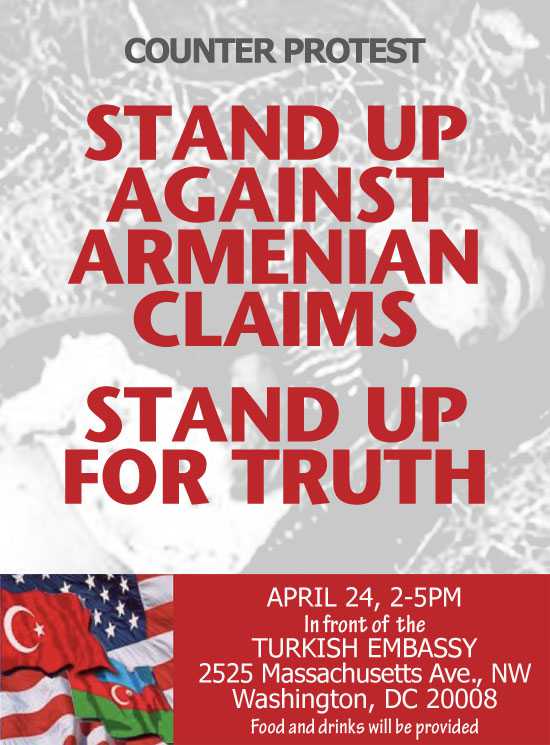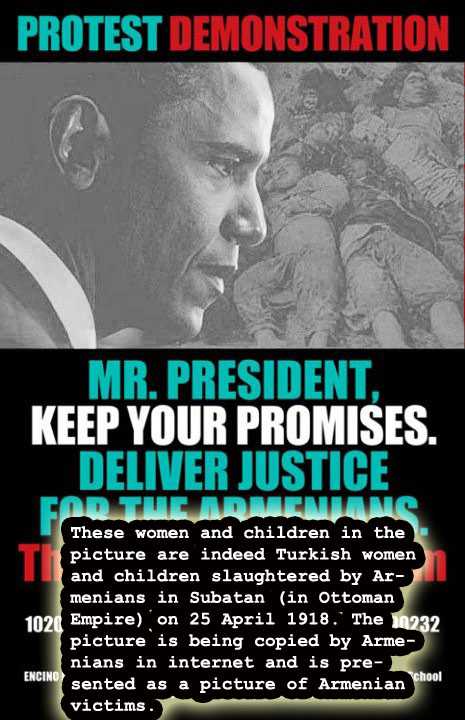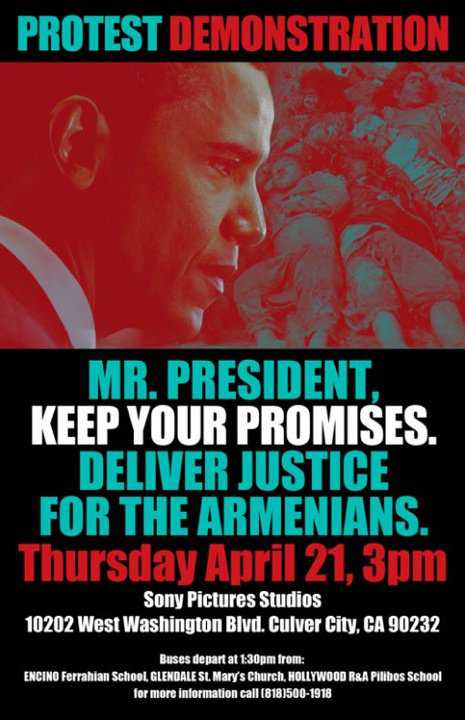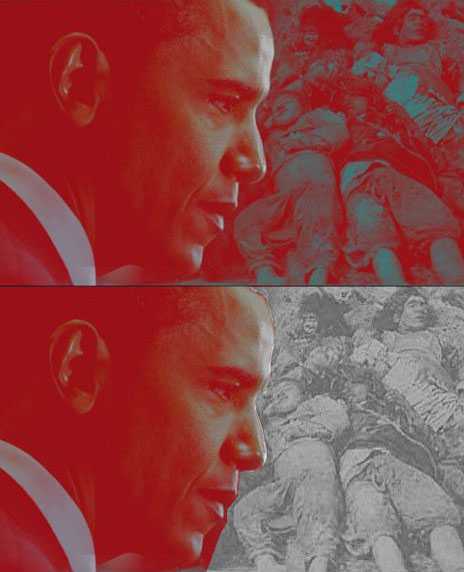Category: America
-

ACTION ALERT Call President Obama
 Dear Friends and Members of the Turkish-American Community:
Dear Friends and Members of the Turkish-American Community:Azerbaijani and Turkish American organizations throughout America have initiated a major campaign to urge President Obama not to use the term “genocide” if his Administration chooses to make a statement regarding events that occurred in the Ottoman Empire in 1915.
To date, no American President has described the events of 1915 as genocide. Unlike many other tragedies and massacres, whether the Armenian case constitutes genocide is widely disputed. The Armenia allegation of genocide has even been rejected by the United Nations.
We urge Turkish Americans and friends of Turkey to send their messages to President Obama and Congress NOW!
Please click on the following links to take urgent action:- Click here to send your message to President Obama not to use the term “genocide” when describing the sad events in the Ottoman Empire in early 1900’s.
- Click here to send your message to your legislators.
- Click here to send your message to your legislators to celebrate April 23rd, as per H.Res 221.
We also encourage you to send your message by calling the White House at 202.456.1111 between 9:00am and 5:00pm, EST. In addition, you may reach the White House online at www.whitehouse.govwww.ataa.org -

Another Meds Yeghern
2011 | Another Meds Yeghern |The White House
Office of the Press Secretary
For Immediate Release April 24, 2010
Statement of President Barack Obama on Armenian Remembrance Day

On this solemn day of remembrance, we pause to recall that ninety-five years ago one of the worst atrocities of the 20th century began. In that dark moment of history, 1.5 million Armenians were massacred or marched to their death in the final days of the Ottoman Empire.
Today is a day to reflect upon and draw lessons from these terrible events. I have consistently stated my own view of what occurred in 1915, and my view of that history has not changed. It is in all of our interest to see the achievement of a full, frank and just acknowledgment of the facts. The Meds Yeghern is a devastating chapter in the history of the Armenian people, and we must keep its memory alive in honor of those who were murdered and so that we do not repeat the grave mistakes of the past. I salute the Turks who saved Armenians in 1915 and am encouraged by the dialogue among Turks and Armenians, and within Turkey itself, regarding this painful history. Together, the Turkish and Armenian people will be stronger as they acknowledge their common history and recognize their common humanity.
Even as we confront the inhumanity of 1915, we also are inspired by the remarkable spirit of the Armenian people. While nothing can bring back those who were killed in the Meds Yeghern, the contributions that Armenians have made around the world over the last ninety-five years stand as a testament to the strength, tenacity and courage of the Armenian people. The indomitable spirit of the Armenian people is a lasting triumph over those who set out to destroy them. Many Armenians came to the United States as survivors of the horrors of 1915. Over the generations Americans of Armenian descent have richened our communities, spurred our economy, and strengthened our democracy. The strong traditions and culture of Armenians also became the foundation of a new republic which has become a part of the community of nations, partnering with the world community to build a better future.
Today, we pause with them and with Armenians everywhere to remember the awful events of 1915 with deep admiration for their contributions which transcend this dark past and give us hope for the future.
-

Obama shuns ‘genocide’ label for Armenian killings

People carry torches during a rally through the streets of Yerevan WASHINGTON — US President Barack Obama marked Saturday the anniversary of the 1915 massacre of Armenians by Ottoman Turks, calling for a “full” acknowledgment of the killings hotly contested by Ankara.
While denouncing the “horrific events” of 96 years ago, Obama stopped short of labeling the killings a “genocide,” despite vowing to use that exact term during his 2008 run for the White House.
“I have consistently stated my own view of what occurred in 1915, and my view of that history has not changed,” the president said in a White House statement on Armenian Remembrance Day.
“A full, frank, and just acknowledgment of the facts is in all our interests.”
In implicitly pleading for Turkey’s recognition of the killings, he stressed that “contested history destabilizes the present and stains the memory of those whose lives were taken, while reckoning with the past lays a sturdy foundation for a peaceful and prosperous shared future.”
Ankara’s ambassador in Washington promptly rejected Obama’s criticism, subdued or not.
“We deeply regret that POTUS (Obama’s) statement on 1915 events reflect an inaccurate, flawed & one-sided political characterization of history,” Ambassador Namik Tan tweeted, calling the comments “unacceptable” and “unwarranted.”
“The US should encourage normalization and dialogue and not hamper it with one-sided & politically motivated statements.”
The Armenian Assembly of America, a group promoting US-Armenian ties, was also not satisfied with Obama’s carefully worded statement, calling it a “missed opportunity” and saying “we expect the president to honor his prior commitments and statements.”
“Words do matter, and today’s statement on the eve of Easter and the commemoration of the Armenian genocide was a missed opportunity to help heal open wounds of the past,” said Armenian Assembly executive director Bryan Ardouny, noting that ex-US president Ronald Reagan used the controversial term.
“Genocide and its denial are pernicious, and the US needs to squarely address the consequence of genocide denial through unequivocal affirmation of this historical truth.”
Turkey and Armenia signed landmark protocols in 2009, under Swiss mediation, which were a first step towards ending decades of hostility over World War I massacres of Armenians under Ottoman Turks.
“I support the courageous steps taken by individuals in Armenia and Turkey to foster a dialogue that acknowledges their common history,” Obama said as he hailed the contributions of Armenian Americans.
“Our hearts and prayers are with Armenians everywhere as we recall the horrors of the Meds Yeghern, honor the memories of those who suffered, and pledge our friendship and deep respect for the people of Armenia,” he added in using the Armenian term meaning “great calamity” to describe the killings.
Last year, a diplomatic row erupted between Washington and Ankara after a congressional measure sought to brand the Ottoman massacres of Armenians as “genocide.”
Turkey recalled Ambassador Tan from Washington when a congressional panel adopted the text in March 2010 and sent him back a month later after the resolution failed to proceed to a full vote in the House of Representatives at the time.
Earlier Saturday, some 10,000 people rallied in the Armenian capital Yerevan to demand that Turkey recognize the “genocide” of up to 1.5 million of their kin. Hordes of youths marched with candles up to a hillock in Yerevan, consecrated to the memory of the victims.
The persecutions are commemorated every year on April 24. On that day in 1915, more than 200 Armenian intellectuals and community leaders were arrested in Constantinople, or present day Istanbul. That was followed by a wave of massacres and deportations that continued until 1917.
Turkey rejects the “genocide” label, countering that 300,000 to 500,000 Armenians and at least as many Turks died in civil strife when Armenians rose up against their Ottoman rulers and sided with invading Russian forces.
Copyright © 2011 AFP. All rights reserved. More »
via AFP: Obama shuns ‘genocide’ label for Armenian killings.
-

Armenian Americans to rally outside Obama fundraiser
Southern Californian Armenian Americans plan to rally Thursday near near where President Obama will be attending a fundraiser in Culver City.
Armenians want to show their frustration with Obama’s refusal to officially recognize the Armenian genocide of 1915, in which an estimated 1.5 million Armenians were massacred by Ottoman Turks. Turkey, a U.S. ally, denies that the deaths constituted genocide.
The Armenian National Committee has arranged for chartered buses to pick up protesters at St. Mary’s Armenian Apostolic Church in Glendale and other points in Hollywood and Encino.
They will then be taken to the 3 p.m. rally at Sony Pictures studio in Culver City.
Read the full story: Armenian community gears up to rally outside fundraiser
via Armenian Americans to rally outside Obama fundraiser | L.A. NOW | Los Angeles Times.
-

Joint article on Libya: The pathway to peace
Friday 15 April 2011

Prime Minister David Cameron, President Barack Obama and President Nicolas Sarkozy have written a joint article on Libya underlining their determination that Qadhafi must “go and go for good”.
Read the article
Together with our NATO allies and coalition partners, the United States, France and Britain have been united at the UN Security Council, as well as the following Paris Conference, in building a broad-based coalition to respond to the crisis in Libya. We are equally united on what needs to happen in order to end it.
Even as we continue military operations today to protect civilians in Libya, we are determined to look to the future. We are convinced that better times lie ahead for the people of Libya, and a pathway can be forged to achieve just that.
We must never forget the reasons why the international community was obliged to act in the first place. As Libya descended into chaos with Colonel Qadhafi attacking his own people, the Arab League called for action. The Libyan opposition called for help. And the people of Libya looked to the world in their hour of need. In an historic Resolution, the United Nations Security Council authorised all necessary measures to protect the people of Libya from the attacks upon them. By responding immediately, our countries halted the advance of Qadhafi’s forces. The bloodbath that he had promised to inflict upon the citizens of the besieged city of Benghazi has been prevented.
Tens of thousands of lives have been protected. But the people of Libya are suffering terrible horrors at Qadhafi’s hands each and every day. His rockets and his shells rained down on defenceless civilians in Ajdabiya. The city of Misrata is enduring a mediaeval siege, as Qadhafi tries to strangle its population into submission. The evidence of disappearances and abuses grows daily.
Our duty and our mandate under UN Security Council Resolution 1973 is to protect civilians, and we are doing that. It is not to remove Qadhafi by force. But it is impossible to imagine a future for Libya with Qadhafi in power. The International Criminal Court is rightly investigating the crimes committed against civilians and the grievous violations of international law. It is unthinkable that someone who has tried to massacre his own people can play a part in their future government. The brave citizens of those towns that have held out against forces that have been mercilessly targeting them would face a fearful vengeance if the world accepted such an arrangement. It would be an unconscionable betrayal.
Furthermore, it would condemn Libya to being not only a pariah state, but a failed state too. Qadhafi has promised to carry out terrorist attacks against civilian ships and airliners. And because he has lost the consent of his people any deal that leaves him in power would lead to further chaos and lawlessness. We know from bitter experience what that would mean. Neither Europe, the region, or the world can afford a new safe haven for extremists.
There is a pathway to peace that promises new hope for the people of Libya. A future without Qadhafi that preserves Libya’s integrity and sovereignty, and restores her economy and the prosperity and security of her people. This needs to begin with a genuine end to violence, marked by deeds not words. The regime has to pull back from the cities it is besieging, including Ajdabiya, Misrata and Zintan, and their forces return to their barracks. However, so long as Qadhafi is in power, NATO and its coalition partners must maintain their operations so that civilians remain protected and the pressure on the regime builds. Then a genuine transition from dictatorship to an inclusive constitutional process can really begin, led by a new generation of leaders. In order for that transition to succeed, Colonel Qadhafi must go and go for good. At that point, the United Nations and its members should help the Libyan people as they rebuild where Qadhafi has destroyed – to repair homes and hospitals, to restore basic utilities, and to assist Libyans as they develop the institutions to underpin a prosperous and open society.
This vision for the future of Libya has the support of a broad coalition of countries, including many from the Arab world. These countries came together in London on 29 March and founded a Contact Group which met this week in Doha to support a solution to the crisis that respects the will of the Libyan people.
Today, NATO and its coalition partners are acting in the name of the United Nations with an unprecedented international legal mandate. But it will be the people of Libya, not the UN, that choose their new constitution, elect their new leaders, and write the next chapter in their history.
Britain, France and the United States will not rest until the United Nations Security Council resolutions have been implemented and the Libyan people can choose their own future.
The Prime Ministers Office
Number 10



